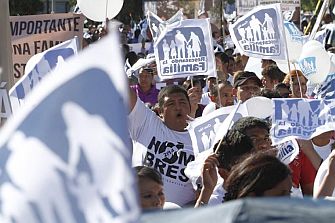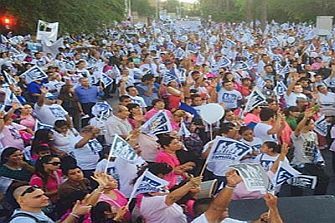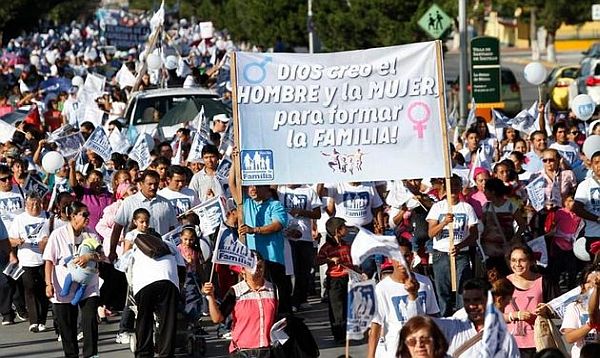Saltillo, Mexico - A little more than a week after new legislation was passed allowing same-sex marriage in the border state of Coahuila, thousands of Mexican demonstrators took to the streets to protest and voice their support for what they called "traditional marriage" - defined as a union between a man and a woman.
Last Sunday, protestors in the city of Saltillo, the capital of the northern Mexico state, said they wanted to "express their disapproval of recent legislation passed supporting marriage equality, and hoped that divine intervention would help change the minds of people in the state and Mexico as a whole," where acceptance of same-sex marriage continues to gain support.
The march, which promoted itself with the slogan "Rescuing the Family," was organized by the pastor Carlos Pacheco, who heads up Cristo Vive Saltillo (Christ Lives Saltillo,) one of 18 chapters of Cristo Vive Mexico.
 |
Pacheco said the goal of the march was to "make Saltillo aware that what is correct and approved by God is a family with a man and a woman, and anything else is an attack on the family."
Demonstrators waved banners with an image of a heterosexual family, wore white shirts and chanted "True love is found in mom and dad."
The pastor, who led the march carrying a large Bible, was surrounded throughout the event by a large team of bodyguards.
Supporters passed out pamphlets touting the organization’s success in helping people who previously identified as gay or lesbian through a "rehabilitation" process. These people, according to the promotional material, are now "part of happy marriages, as God established from the beginning."
According to organizers, as many as 48,000 people participated in the demonstration, while the Mexican media estimated the "sea of people" to contain around 30,000 attendees.
Coahuila’s state congress passed laws allowing same-sex marriage at the beginning of September, making it the first Mexican state to approve marriage equality - allowing adoption and all other benefits that marriage means - through its state legislature. The state's civil code, which had previously defined marriage as a "union between a man and woman for the purpose of procreation," was changed to "a union between two people with the possibility of procreation or adoption.
 |
The protest came a week and a day after a male gay couple inaugurated the law and a day after the state's first lesbian couple exchanged vows.
Gay couples can also marry in the federal district of Mexico City, where lawmakers approved a marriage law in 2009. Such unions have also taken place in Quintana Roo, where the state's civil code is gender neutral.
The protest comes just a few days after several Latin American countries introduced a resolution to the United Nations that aims to combat violence targeting LGBT persons. The document, which Human Rights Watch called a "landmark" resolution, condemns violence and discrimination against individuals based on their sexual orientation and gender identity.
The U.N. Human Rights Council approved the resolution by a 25-14 margin, after strong opposition from Russia and countries in Africa and the Middle East.
In a somewhat surprising development, the document was drafted and introduced by the traditionally Catholic countries of Latin America, Brazil, Colombia, Chile, and Uruguay. Costa Rica, Cuba, Mexico, Peru, and Venezuela added their support to the resolution, making approval unanimous among the council's Latin American nations.
Latin American advocacy groups applauded the widespread government support for the resolution as an important step for equal rights, but pointed out that many of these countries still have some of the highest rates of discrimination and violence against the LGBT community.
Source: Latin Correspondent


